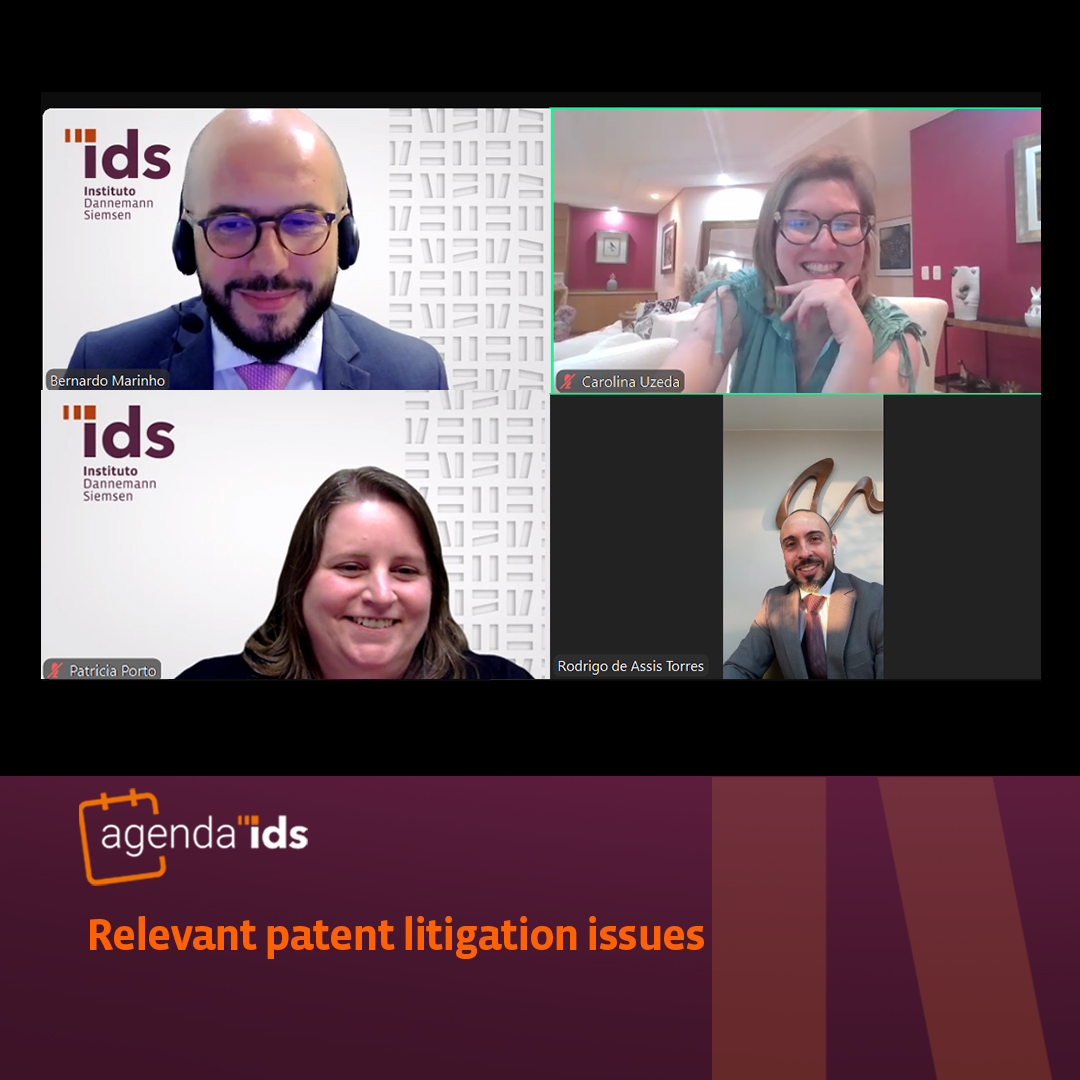02 de dezembro de 2024
Share
IDS debates relevant patent litigation issues
Last Tuesday (26), the Dannemann Siemsen Institute (IDS) held another IDS Agenda, this time with the aim of discussing relevant issues involving patent litigation. The event covered topics such as: the cause of action in nullity actions; the plea of nullity in infringement actions; and external prejudiciality, among other subjects. In this sense, the event also covered the jurisprudential debate on the possibility of arguing patent invalidity as a defense in the context of infringement actions.
The event was opened by IDS’s academic coordinator, Patrícia Porto, and was moderated by IDS board member and Dannemann Siemsen partner, Bernardo Marinho Fontes Alexandre. As guests, we welcomed lawyer Rodrigo de Assis Torres, a partner at Dannemann Siemsen and also an IDS board member. We also welcomed lawyer Carolina Uzeda, a partner at Arruda Alvim, Aragão, Lins & Sato.
Bernardo began his moderation by explaining the controversy surrounding Art. 56 of the Industrial Property Law (Law 9279/96), which deals precisely with the pleading of patent invalidity as a defense matter. He therefore invited lawyer Carolina Uzeda to take the floor and give her perspective on the issue, in which the speaker first criticized the existence of such conflicting decisions on the matter. She analyzed, from a proceduralist point of view, the constitutional impossibility of suppressing the right of defense under the Brazilian legal system, as well as pointing out that the creation of conditions for exercising this right is also incompatible, referring to the filing of lawsuits in other jurisdictions, specifically the Federal Court, for these cases.
Rodrigo de Assis Torres then went on to address the issue of nullity in his speech. He brought up the aspect of the Brazilian procedural system of being comprehensive and protective of a party’s ability to defend itself, as well as the aspect of the concentration of the defense, at the procedural moment of the defense. In this vein, he also spoke about the issue of external prejudiciality, i.e. the effects of res judicata in a nullity action also being produced in an infringement action, when the two actions take place in different spheres of competence. On this point, the speaker cited the Brazilian Superior Court’s position that the grounds of an incidental plea do not become res judicata. Thus, even if there is a decision regarding the invalidity of a patent in the State Court, it will have the purpose of helping to resolve the dispute, but it will not become res judicata. The speaker also noted the issue of good faith in each specific case, when it comes to the possibility of bringing a nullity matter in the infringement action itself. The speaker also noted the issue of good faith in each specific case, when it comes to the possibility of bringing nullity matters in the infringement action itself.
When thinking about effective solutions for separate proceedings, Rodrigo cited the academic thesis of the consensual acts, formulated by lawyer Marcelo Mazzola, which stipulates joint expert production, as well as communication and cooperation between judges and lawyers. Here, Carolina Uzeda also emphasized the creation of IP cooperation courts, with the aim of minimizing risks for litigants and promoting greater legal certainty.
Bernardo went on to discuss the application of external prejudiciality in actions for nullity or infringement. At this point, both Carolina and Rodrigo spoke again about the legal uncertainty caused by the lack of clarity and rules with requirements for suspending a process pending the assertion of a right with a presumption of validity, such as a patent right. Here, Rodrigo emphasized the need for balance between making a constitutionally guaranteed right effective and ensuring the defendant’s right to a defense. Carolina concludes by pointing out that the gaps in the current legislative panorama make it possible for contradictory understandings to be formed in these cases, such as the discussion on the time limit for a stay due to external prejudiciality until sentencing.
Finally, the issue of delimiting the cause of action in patent invalidity actions was debated, especially in relation to the expert’s role in relation to the arguments presented in the initial petition. The speaker Carolina expressed the opinion that the request in the initial petition delimits the object that will be judged in the dispute. In his report, the expert must stick to what was requested in the initial petition, the cause of action, what was indicated in the initial petition as a relevant fact. And it is the judge’s duty, as the controller of the case, to decide in accordance with the object of the claim and the cause of action, unless the parties expressly agree.
The recordings will be made available on the IDS website shortly.
Note: For quick release, this English version is provided by automated translation without human review.
